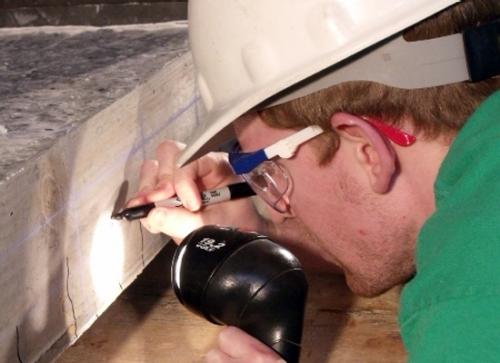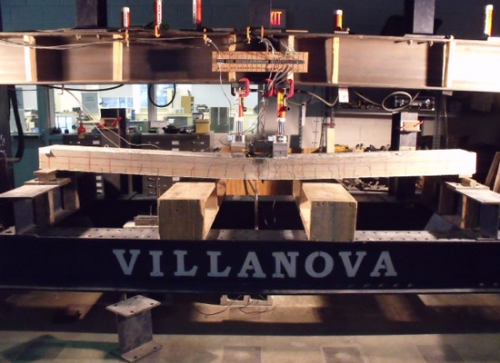Nicholas Mascitelli CE '12 Wins Third Place in ACI Concrete Projects Competition
With guidance and support from Dr. Joseph Yost PE, Associate Professor of Civil and Environmental Engineering, and Dr. Aleksandra Radlinksa, Assistant Professor of Civil and Environmental Engineering, Nicholas Mascitelli CE ’12 won third place in the American Concrete Institute (ACI) 2011 Concrete Projects Competition.
“I was surprised when I was informed I won an award for my project. I put 10 to12 hours a week into this project, and to be recognized by a national organization is a great accomplishment. This research allowed me to realize two aspects about myself. I learned that I am capable of more than I expected, and it opened up my perspectives on environmental sustainability,” says Mascitelli.
Mascitelli’s paper, entitled “Serviceability and Elastic Behavior of Alkali-Activated Fly Ash Concrete,” discusses the replacement of Portland cement with 100 percent fly ash, a residue of coal and a relatively new approach, considering previous researchers have only incorporated approximately 30 percent fly ash. Portland cement is the most abundantly used cement, but it yields about 7 percent of all carbon emissions.

“One ton of Portland cement gives off one ton of CO2 emissions,” states Mascitelli. “Using beams of fly ash, we used load pistons to apply force to each beam to calculate the strain and deformation. We wanted to see how much weight the beams could endure before they broke in half. The force added to each beam represented the force a building would exert if constructed out of cement,” says Mascitelli.
Using a crane to place the beams in the test frame, Mascitelli produced results surpassing his expectations. “For one of the beams, we had to continuously increase the load amount, reaching up to 16,000 pounds,” Mascitelli says with excitement. The results from this project suggested using 100 percent fly ash generated comparable values and sometimes exceeded the load amount of Portland cement. Fly ash is also cheaper to produce, is recycled material, and does not produce CO2 emissions.
The semester-long project further solidified Mascitelli’s passion for civil engineering. “I can now accurately see myself as a hands-on construction manager at an engineering company,” he says. After graduation, he wants to pursue graduate school and learn how he can incorporate environmental sustainability into his career. “The practical experience I have gained from this opportunity will allow me to bring a set of skills to the workplace that employers are so keen to have,” says Mascitelli.
A nonprofit educational and technical society, the ACI is one of the world’s leading authorities in concrete technology, with a focus on design, material, and/or construction. All entries were submitted by undergraduate students in the form of computer programs, papers, or student activities.

A beam deforming under a calculated load in the Structural Engineering Teaching and Research Laboratory
